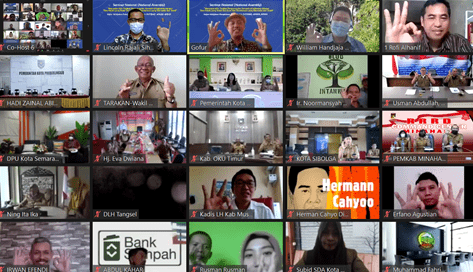A new study on plastics and waste management will support the Indonesian Government in stopping 40 million tons of waste from polluting the environment, and in managing 80% of waste by 2025.
In partnership with the Norwegian Ministry of Foreign Affairs, the Association of Indonesian Regency Government (APKASI) and the Association of Indonesian Municipalities Government (APEKSI), SYSTEMIQ has been investigating the root causes of Indonesia’s waste system challenges and ways to create a circular plastic system.
The Government of Indonesia has shown immense commitment to waste management, setting a national target of 30% waste reduction and 70% waste management by 2025, including 70% ocean plastic reduction by 2025. However, in April 2020 the National Plastic Action Partnership (NPAP) found that less than 40% of waste is managed well in Indonesia: 40 million tons of waste, including 4 million tons of plastic, still flow to the environment. NPAP’s report set a target of doubling the waste management level to 80% by 2025.
Two key factors: location and governance
NPAP found that remote areas and smaller rural municipalities often have lower levels of waste management. Mapping and governance are also a challenge: more than 70% of Reduce, Reuse, and Recycle Waste Management Facilities (known as TPS3R) and 40% of Integrated Waste Management Facilities (TPST) in Indonesia are abandoned or of unknown status; from year to year, the landfills are turning into open dumping facilities.
The problem calls for a systemic approach and the application of clear standards. “Waste management must be done from the upstream to the downstream, by prioritizing waste management at the source, and implementing three core aspects: governance, capacity improvement, and funding,” said the Deputy of Environment and Forestry Coordination for the Coordinating Ministry of Maritime and Investment Affairs, Nani Hendiarti. “A strong institutional model for waste management is required, that can be realized through BLUD [the Regional Public Service Agency], and it is important to be supported with clear Minimum Service Standards in waste service, adequate budget support, and law enforcement.”
There are already plans to implement the report. For example, new regulations would shift full responsibility for waste management to the district or municipal government, with a focus on the role of behavioural shifts, at community level, to the 3R principles: reduce, reuse and recycle. Information campaigns and law enforcement will focus on reducing the burning of waste and other environmentally harmful disposal.
Building stakeholder support
The launch seminar saw official representation from the Coordinating Ministry of Maritime and Investment Affairs, Ministry of Home Affairs, Ministry of Environment and Forestry, National Development Planning Agency (Bappenas), Ministry of Public Works and Housing (PUPR), and district and municipal governments. There was keen participation from NGOs and private sector, waste management institution, and funding stakeholders, as well as representatives of foreign nations, embassies, donor institutions, and international development and financial institutions in Indonesia.
This reflects an analysis that went both broad and deep in search of solutions. “This study is not merely based on real experiences and real data from field implementation, it also analyses the practices of other countries”, explained Lincoln Rajali Sihotang, Program Manager of SYSTEMIQ Policy Studies. “The initial findings were consulted with the various ministries, as well as the experts and relevant stakeholders, to obtain the comprehensive results of the study.”

